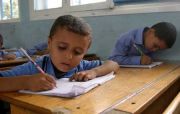子どもネットの皆様
こんばんは、イノウエです。
本日、標記のアムネスティ国際ニュースがリリースされました。
今回も、以前に何度か私から翻訳をお願いした米国在住の翻訳家/ラナさんに
一次訳をお願いしました。
二次訳者さんにもとても好評だったそうです。
ラナさん、どうもありがとうございました!
------------------------------------------------------------
スロバキア共和国:ロマの子どもたちへの教育上の差別
-------------------------------------------------------------
AI Index: EUR 72/000/2007 *子どもネットワーク翻訳(1次訳)
「ここの子どもたちは知的障害を持っています。ロマの子どもたちを普通
の小学校に統合させようという傾向がある一方で、知的障害のある子ども
たちと社会的に障害がある子どもたちは同じ状態に置かれています。社会
的に不利な境遇にいる子どもたちは社会的および知的障害の双方に苦しん
でいるのです」。―生徒の95パーセントがロマである特別学校の校長
ロマの子どもたちの相当数が知的障害や学習障害を持つ子どもたちのため
の特別学校や特別学級、または国内各地にあるロマ専用の普通学校に入れ
られているとアムネスティ・インターナショナルの関係者は語った。
アムネスティの報告書”Still separate, still unequal: Violations of
the right to education for Romani children in Slovakia” による
と、特別学校の教育内容が普通学校と比べ不十分なため、ロマの子どもた
ちが普通学校に編入したり上級学校に進むことはほぼ不可能とされてい
る。
この報告書では、スロバキア当局が、ロマの子どもたちの教育において一
般的になっている隔離を根絶する意思を明確に表示し、事態を変えるため
の対応策を迅速にとるように要請している。
「個人の能力にかかわらず、ロマの子どもたちは隔離された学級で標準以
下の教育を受けている。政府が彼らに適切な教育を提供しなければ、将来
の雇用の見込みがなくなり、社会から無視されたり貧困に陥るという悪循
環を助長することになる」とアムネスティのヨーロッパ・中央アジア部長
ニコラ・ダックワースは述べている。
アムネスティは、ロマの子どもを特別学校や普通学校の特別な補習学級に
入れるための評価の方法や基準が、文化や言語の違いを考慮していないた
め、差別的な結果を生む可能性があると見ている。この学力評価過程を検
討したところ、特殊学校や特殊学級にいるロマの子どもたちの50%近く
が、誤ってそれらの学校や学級に入れられていたということが明らかに
なった。
「人里離れたところで電気や水道のない掘っ立て小屋に暮らしている子ど
もがトイレの水を流すことやバスルームの使い方を知っているはずがな
く、鉛筆の持ち方や絵の描き方、スロバキア語を話すことも知らない。し
かしそれを理由に適切な教育を受ける権利を彼らから奪うことは許されな
い」とニコラ・ダックワースは語った。
さらにロマだけの学校や学級が広範に存在することについてもアムネス
ティは懸念している。スロバキア東部のある地区では、学校は100パー
セント隔離されている。スロバキアの法律によると、親は子どもの学校を
選択する権利がある。この方針は一見、中立の立場をとっているように思
えるが、実際は隔離を助長している。親の選択の自由によって、ロマの子
どもたちが大半を占める学校からはロマでない子どもたちが退学するケー
スが増える結果となったと伝えられている。また、そうした親の選択に加
えて、ロマの子どもたちのための無料の通学手段がないことが相まって隔
離を助長し、スロバキアにおけるロマとロマ以外の子どもたちの相互交流
を大きく阻害している。
スロバキア政府は、隔離は政府の方針ではないと主張しているものの、そ
れを問題と認めることもなければ、阻止しようという真剣な努力も見られ
ない。
アムネスティは、スロバキア政府が準備クラスの増設、補助教員の雇用、
普通学校がロマの子どもたちを受け入れることに対する奨励金、さらには
ロマの子どもたちを教えるための教師養成などの特別対策を採用したこと
を歓迎している。しかしながら、これらの対策は義務付けられておらず、
地方レベルで実施されていない場合が多いことも事実である。
教育を受ける権利は、適切な住居を得る権利など、その他の重要な人権に
つながっている。スロバキアのロマ人口の約3分の1が街外れの集落に住
んでおり、水道、電気、下水道設備、舗装道路、その他の基幹施設は全く
ないか、あるいは乏しい。このようにロマの住宅が劣悪なために、子ども
たちが教育を受ける権利を行使することが非常に難しくなっている。スロ
バキア東部にあるレタノヴチェ近郊のロマ居住地区に住むカタリナ・クル
テノヴァさんはアムネスティの代表団に「家にはろうそくが1本しかな
く、子どもたちに家で勉強してほしいけれど、それではすぐなくなってし
まうから・・・」と語った。
「ロマの人々も他のスロバキア国民と同じような希望を持っている。政府
はロマの子どもたちが教育を受ける権利を促進し、保護し、充足させる責
任を果たすべきだ。またロマの隔離と貧しい居住地区を過去のものとしな
ければならない」とニコラ・ダックワースは述べた。
「欧州連合にはスロバキアも加入しており、ロマの子どもたちが教育を受
ける権利に関して政府が制度的な侵害に対して真剣に取り組むことを支援
するのは非常に大切なことだ。欧州連合は必要な財政的、技術的援助を行
い、ロマのコミュニティが自分たちの生活に影響する政策やプログラム実
施の各段階において関われるようにすべきである」。
*詳細は以下を参照ください(英文のみ):
Still separate, still unequal: Violations of the right to
education for Romani children in Slovakia, AI Index: EUR
72/001/2007
http://
Slovakia: Roma and the right to education, Factsheet, AI Index:
EUR 72/005/2007
http://
Europe: Discrimination against Roma, AI Index: EUR 01/012/2007
http://
-----------------------------------------
AI Index: EUR 72/000/2007
15 November 2007
Slovak Republic: Romani children denied equal education free from
discrimination“Children here are mentally retarded. There is a
tendency to integrate Romani children in primary schools, but
pupils with mental and social retardation stay the same. Children
from a socially disadvantaged environment suffer from social and
mental retardation.”Head teacher of a special school where 95 per
cent of the pupils are Roma
Huge numbers of Romani children are still being placed in special
schools and classes for children with mental disabilities and
learning difficulties, or segregated in Roma-only mainstream
schools across the country, Amnesty International said today.
The organization's report, Still separate, still unequal:
Violations of the right to education for Romani children in
Slovakia, reveals that Romani children placed in special schools
receive a reduced curriculum and have practically no possibilities
of reintegrating into mainstream schools or advancing to secondary
education.
The reports calls on the authorities of Slovakia to state
unequivocally their determination to eradicate the widespread
segregation in the education of Romani children and to take swift
measures to reverse it.
"Regardless of their individual abilities, Romani children receive
a sub-standard education in segregated classes. The failure of the
government to provide adequate education for them blights their
future employment prospects, and adds to a cycle of
marginalization and poverty for Roma people," said Nicola
Duckworth, Europe and Central Asia Programme Director at Amnesty
International.
Amnesty International is concerned that the way assessments are
conducted and the criteria used to place a child in a special
school or special remedial class within mainstream schools could
amount to discrimination as they do not take into account
effectively cultural and linguistic differences. Evaluations of
the process revealed that up to 50 per cent of Romani children in
special schools or classes had been placed there erroneously.
"A child living in a shack with no electricity or running water in
the middle of nowhere will not know how to flush a toilet or use a
bathroom. Such a child would not know how to hold a pencil or draw
a picture or speak Slovak but this should not deprive them of
their basic right to proper education," Nicola Duckworth said.
A further concern to Amnesty International is the widespread
existence of Roma-only schools and classes. In some parts of
eastern Slovakia, 100 per cent of schools are segregated.
According to Slovak law, parents have the right to choose their
child’s school. This policy, taken at face value, appears neutral
- but, in fact, contributes to segregation. Freedom of parental
choice has reportedly resulted in increased withdrawal of non-
Romani children from schools predominantly attended by Romani
children. Parental choice, coupled with the lack of free
transportation for Romani children to school has influenced
segregation and radically reduced interaction between Roma and
other children in Slovakia.
Although the government of Slovakia insists that segregation is
not official government policy, so far it has failed to recognize
it as a problem or genuinely commit to stopping it.
Amnesty International welcomes the special measures that the
government of Slovakia has introduced, such as preparatory
classes, the employment of teaching assistants, financial
incentives for mainstream schools to integrate Romani children, as
well as some training for teachers working with Romani children.
However, all these measures are not compulsory and in many cases
they are not implemented at local level.
The right to education is linked to other important human rights,
such as the right to adequate housing. Approximately one third of
the Romani population in Slovakia live in settlements situated
outside towns and villages, with limited or no water or
electricity supplies, sanitation systems, paved roads or other
basic infrastructure. The inadequate housing of Roma has a
significant impact on the ability of Romani children to exercise
their right to education. Katarina Kru?tenova from the Roma
settlement near Letanovce in Eastern Slovakia told Amnesty
International delegates: "We have one candle and we want the
children to study at home, but it is over very quickly...".
"The Roma have the same aspirations as the majority population in
Slovakia. The government must assume responsibility and promote,
protect and fulfil the right to education of Romani children. It
must also make the Roma segregated and impoverished settlements a
thing of the past." Nicola Duckworth said.
"It is very important that the European Union, of which Slovakia
is a member, supports the government in all genuine efforts to
address the systematic violation of the right to education of
Romani children. The European Union can do so by providing
necessary financial and technical assistance and ensuring the
participation of the Roma community in all stages of taking and
implementing policies and programmes affecting their lives."
See:
Still separate, still unequal: Violations of the right to
education for Romani children in Slovakia, AI Index: EUR
72/001/2007
http://
Slovakia: Roma and the right to education, Factsheet, AI Index:
EUR 72/005/2007
http://
Europe: Discrimination against Roma, AI Index: EUR 01/012/2007
http://
こんばんは、イノウエです。
本日、標記のアムネスティ国際ニュースがリリースされました。
今回も、以前に何度か私から翻訳をお願いした米国在住の翻訳家/ラナさんに
一次訳をお願いしました。
二次訳者さんにもとても好評だったそうです。
ラナさん、どうもありがとうございました!
------------------------------------------------------------
スロバキア共和国:ロマの子どもたちへの教育上の差別
-------------------------------------------------------------
AI Index: EUR 72/000/2007 *子どもネットワーク翻訳(1次訳)
「ここの子どもたちは知的障害を持っています。ロマの子どもたちを普通
の小学校に統合させようという傾向がある一方で、知的障害のある子ども
たちと社会的に障害がある子どもたちは同じ状態に置かれています。社会
的に不利な境遇にいる子どもたちは社会的および知的障害の双方に苦しん
でいるのです」。―生徒の95パーセントがロマである特別学校の校長
ロマの子どもたちの相当数が知的障害や学習障害を持つ子どもたちのため
の特別学校や特別学級、または国内各地にあるロマ専用の普通学校に入れ
られているとアムネスティ・インターナショナルの関係者は語った。
アムネスティの報告書”Still separate, still unequal: Violations of
the right to education for Romani children in Slovakia” による
と、特別学校の教育内容が普通学校と比べ不十分なため、ロマの子どもた
ちが普通学校に編入したり上級学校に進むことはほぼ不可能とされてい
る。
この報告書では、スロバキア当局が、ロマの子どもたちの教育において一
般的になっている隔離を根絶する意思を明確に表示し、事態を変えるため
の対応策を迅速にとるように要請している。
「個人の能力にかかわらず、ロマの子どもたちは隔離された学級で標準以
下の教育を受けている。政府が彼らに適切な教育を提供しなければ、将来
の雇用の見込みがなくなり、社会から無視されたり貧困に陥るという悪循
環を助長することになる」とアムネスティのヨーロッパ・中央アジア部長
ニコラ・ダックワースは述べている。
アムネスティは、ロマの子どもを特別学校や普通学校の特別な補習学級に
入れるための評価の方法や基準が、文化や言語の違いを考慮していないた
め、差別的な結果を生む可能性があると見ている。この学力評価過程を検
討したところ、特殊学校や特殊学級にいるロマの子どもたちの50%近く
が、誤ってそれらの学校や学級に入れられていたということが明らかに
なった。
「人里離れたところで電気や水道のない掘っ立て小屋に暮らしている子ど
もがトイレの水を流すことやバスルームの使い方を知っているはずがな
く、鉛筆の持ち方や絵の描き方、スロバキア語を話すことも知らない。し
かしそれを理由に適切な教育を受ける権利を彼らから奪うことは許されな
い」とニコラ・ダックワースは語った。
さらにロマだけの学校や学級が広範に存在することについてもアムネス
ティは懸念している。スロバキア東部のある地区では、学校は100パー
セント隔離されている。スロバキアの法律によると、親は子どもの学校を
選択する権利がある。この方針は一見、中立の立場をとっているように思
えるが、実際は隔離を助長している。親の選択の自由によって、ロマの子
どもたちが大半を占める学校からはロマでない子どもたちが退学するケー
スが増える結果となったと伝えられている。また、そうした親の選択に加
えて、ロマの子どもたちのための無料の通学手段がないことが相まって隔
離を助長し、スロバキアにおけるロマとロマ以外の子どもたちの相互交流
を大きく阻害している。
スロバキア政府は、隔離は政府の方針ではないと主張しているものの、そ
れを問題と認めることもなければ、阻止しようという真剣な努力も見られ
ない。
アムネスティは、スロバキア政府が準備クラスの増設、補助教員の雇用、
普通学校がロマの子どもたちを受け入れることに対する奨励金、さらには
ロマの子どもたちを教えるための教師養成などの特別対策を採用したこと
を歓迎している。しかしながら、これらの対策は義務付けられておらず、
地方レベルで実施されていない場合が多いことも事実である。
教育を受ける権利は、適切な住居を得る権利など、その他の重要な人権に
つながっている。スロバキアのロマ人口の約3分の1が街外れの集落に住
んでおり、水道、電気、下水道設備、舗装道路、その他の基幹施設は全く
ないか、あるいは乏しい。このようにロマの住宅が劣悪なために、子ども
たちが教育を受ける権利を行使することが非常に難しくなっている。スロ
バキア東部にあるレタノヴチェ近郊のロマ居住地区に住むカタリナ・クル
テノヴァさんはアムネスティの代表団に「家にはろうそくが1本しかな
く、子どもたちに家で勉強してほしいけれど、それではすぐなくなってし
まうから・・・」と語った。
「ロマの人々も他のスロバキア国民と同じような希望を持っている。政府
はロマの子どもたちが教育を受ける権利を促進し、保護し、充足させる責
任を果たすべきだ。またロマの隔離と貧しい居住地区を過去のものとしな
ければならない」とニコラ・ダックワースは述べた。
「欧州連合にはスロバキアも加入しており、ロマの子どもたちが教育を受
ける権利に関して政府が制度的な侵害に対して真剣に取り組むことを支援
するのは非常に大切なことだ。欧州連合は必要な財政的、技術的援助を行
い、ロマのコミュニティが自分たちの生活に影響する政策やプログラム実
施の各段階において関われるようにすべきである」。
*詳細は以下を参照ください(英文のみ):
Still separate, still unequal: Violations of the right to
education for Romani children in Slovakia, AI Index: EUR
72/001/2007
http://
Slovakia: Roma and the right to education, Factsheet, AI Index:
EUR 72/005/2007
http://
Europe: Discrimination against Roma, AI Index: EUR 01/012/2007
http://
-----------------------------------------
AI Index: EUR 72/000/2007
15 November 2007
Slovak Republic: Romani children denied equal education free from
discrimination“Children here are mentally retarded. There is a
tendency to integrate Romani children in primary schools, but
pupils with mental and social retardation stay the same. Children
from a socially disadvantaged environment suffer from social and
mental retardation.”Head teacher of a special school where 95 per
cent of the pupils are Roma
Huge numbers of Romani children are still being placed in special
schools and classes for children with mental disabilities and
learning difficulties, or segregated in Roma-only mainstream
schools across the country, Amnesty International said today.
The organization's report, Still separate, still unequal:
Violations of the right to education for Romani children in
Slovakia, reveals that Romani children placed in special schools
receive a reduced curriculum and have practically no possibilities
of reintegrating into mainstream schools or advancing to secondary
education.
The reports calls on the authorities of Slovakia to state
unequivocally their determination to eradicate the widespread
segregation in the education of Romani children and to take swift
measures to reverse it.
"Regardless of their individual abilities, Romani children receive
a sub-standard education in segregated classes. The failure of the
government to provide adequate education for them blights their
future employment prospects, and adds to a cycle of
marginalization and poverty for Roma people," said Nicola
Duckworth, Europe and Central Asia Programme Director at Amnesty
International.
Amnesty International is concerned that the way assessments are
conducted and the criteria used to place a child in a special
school or special remedial class within mainstream schools could
amount to discrimination as they do not take into account
effectively cultural and linguistic differences. Evaluations of
the process revealed that up to 50 per cent of Romani children in
special schools or classes had been placed there erroneously.
"A child living in a shack with no electricity or running water in
the middle of nowhere will not know how to flush a toilet or use a
bathroom. Such a child would not know how to hold a pencil or draw
a picture or speak Slovak but this should not deprive them of
their basic right to proper education," Nicola Duckworth said.
A further concern to Amnesty International is the widespread
existence of Roma-only schools and classes. In some parts of
eastern Slovakia, 100 per cent of schools are segregated.
According to Slovak law, parents have the right to choose their
child’s school. This policy, taken at face value, appears neutral
- but, in fact, contributes to segregation. Freedom of parental
choice has reportedly resulted in increased withdrawal of non-
Romani children from schools predominantly attended by Romani
children. Parental choice, coupled with the lack of free
transportation for Romani children to school has influenced
segregation and radically reduced interaction between Roma and
other children in Slovakia.
Although the government of Slovakia insists that segregation is
not official government policy, so far it has failed to recognize
it as a problem or genuinely commit to stopping it.
Amnesty International welcomes the special measures that the
government of Slovakia has introduced, such as preparatory
classes, the employment of teaching assistants, financial
incentives for mainstream schools to integrate Romani children, as
well as some training for teachers working with Romani children.
However, all these measures are not compulsory and in many cases
they are not implemented at local level.
The right to education is linked to other important human rights,
such as the right to adequate housing. Approximately one third of
the Romani population in Slovakia live in settlements situated
outside towns and villages, with limited or no water or
electricity supplies, sanitation systems, paved roads or other
basic infrastructure. The inadequate housing of Roma has a
significant impact on the ability of Romani children to exercise
their right to education. Katarina Kru?tenova from the Roma
settlement near Letanovce in Eastern Slovakia told Amnesty
International delegates: "We have one candle and we want the
children to study at home, but it is over very quickly...".
"The Roma have the same aspirations as the majority population in
Slovakia. The government must assume responsibility and promote,
protect and fulfil the right to education of Romani children. It
must also make the Roma segregated and impoverished settlements a
thing of the past." Nicola Duckworth said.
"It is very important that the European Union, of which Slovakia
is a member, supports the government in all genuine efforts to
address the systematic violation of the right to education of
Romani children. The European Union can do so by providing
necessary financial and technical assistance and ensuring the
participation of the Roma community in all stages of taking and
implementing policies and programmes affecting their lives."
See:
Still separate, still unequal: Violations of the right to
education for Romani children in Slovakia, AI Index: EUR
72/001/2007
http://
Slovakia: Roma and the right to education, Factsheet, AI Index:
EUR 72/005/2007
http://
Europe: Discrimination against Roma, AI Index: EUR 01/012/2007
http://
|
|
|
|
|
|
|
|
アムネスティ子どもネットワーク 更新情報
-
最新のアンケート
-
まだ何もありません
-
アムネスティ子どもネットワークのメンバーはこんなコミュニティにも参加しています
人気コミュニティランキング
- 1位
- 福岡 ソフトバンクホークス
- 42987人
- 2位
- 広島東洋カープ
- 55350人
- 3位
- お洒落な女の子が好き
- 89985人




















![緒方貞子 [コミュニティ]](https://logo-imagecluster.img.mixi.jp/photo/comm/25/72/922572_129s.jpg)



